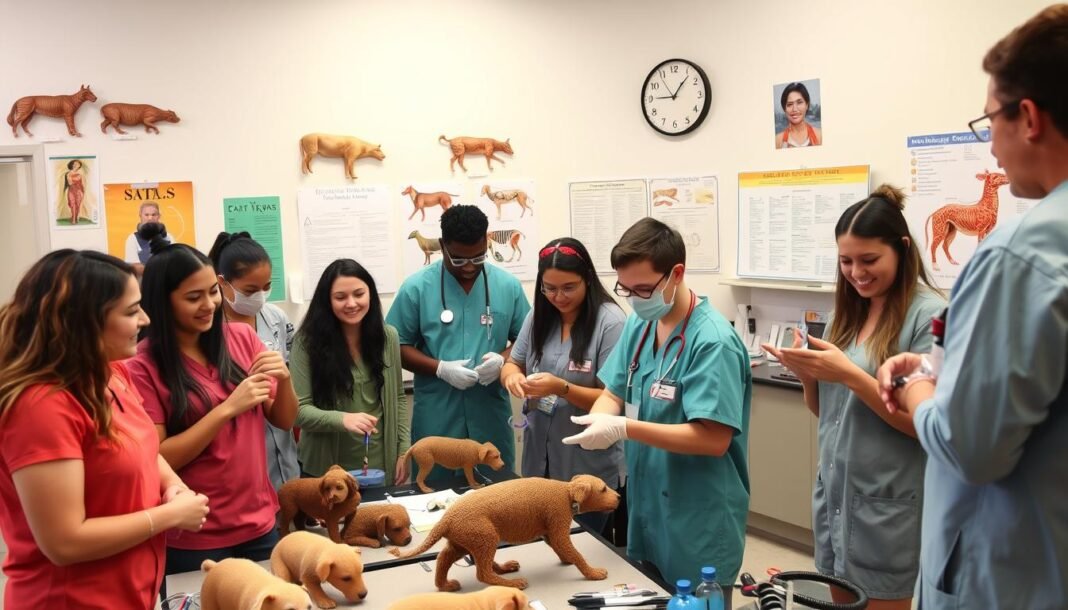Becoming a vet tech requires classroom learning and hands-on training. This guide explores details of vet tech education and training.
We’ll look at veterinary technician education, vet tech training, and school duration. This info will help you plan your animal healthcare career.
A dynamic classroom scene depicting a diverse group of students engaged in hands-on veterinary technician training, surrounded by veterinary tools, anatomical models of animals, and charts on a wall, showcasing an atmosphere of learning and collaboration.
Introduction to Becoming a Veterinary Technician
Veterinary technicians play a key role in animal healthcare. They help vets with tasks like patient care and lab work.
Vet techs work closely with animals to improve their health. They make a big difference in the lives of pets and other creatures.
The proper education is key for a vet tech career. Most vet techs complete a program at a community college.
These programs teach skills needed in animal healthcare. Students learn about anatomy, diagnostic procedures, and talking with pet owners.
A good education opens up many job options for vet techs. They can work in clinics, labs, zoos, or animal shelters.
With hard work, vet techs can have great careers in animal healthcare. The field is constantly changing and growing.
Required Education for Vet Techs
Vet techs have many education options. The most common is an associate degree in veterinary technology.
These two-year programs teach animal care and medical procedures. They also cover lab work.
You can find accredited programs at community colleges and technical schools. Some four-year universities also offer them.
Bachelor’s degrees in veterinary technology are available, too. These four-year programs go deeper into science and clinical work.
They prepare grads for specialized roles or supervisor jobs. Online vet tech courses offer flexible learning options.
All vet tech programs must meet AVMA standards. This ensures grads have the right skills.
Graduates can provide quality animal care. They can also support licensed vets in their work.
Duration of Vet Tech Programs
Vet tech education offers various paths. The most common is a two-year associate degree program. It provides a strong foundation in veterinary science.
Some students choose a four-year bachelor’s degree in veterinary technology. This option covers advanced topics and often includes specializations.
Becoming a vet tech requires time and dedication. Students invest years in gaining knowledge and skills.
The program length is essential to consider. It impacts your educational and career planning.
Certification and Licensure
Becoming a licensed vet tech requires completing an accredited program. Graduates must then pass the National Veterinary Technician Exam (NVTE).
The NVTE covers animal anatomy, physiology, nursing, pharmacology, and lab procedures. States may have extra requirements for licensing.
Licensed vet techs can work in clinics, hospitals, and labs. They must maintain certification and continue their education.

Skills Necessary for Vet Techs
Vet techs need many skills to be successful. These include clinical skills and soft skills for animal care and talking to clients.
Vet techs must know how to give medicine and do lab tests. They also need to know about imaging and essential medical treatments.
Animal care is another key skill for vet techs. They must know how to hold animals safely.
Talking to pet owners is a big part of a vet tech’s job. They answer questions and advise about animal health.
Vet techs need to listen well and explain things clearly. This helps build trust with pet owners.
These skills help vet techs give excellent animal care. They are key to a rewarding career in animal health.
Job Opportunities After Graduation
Certified vet techs have many career paths to explore. You can work in animal clinics, research labs, or other exciting places.
Vet tech jobs are found in many settings. These include animal hospitals, zoos, farms, and even schools.
Grads can work as vet assistants or lab animal caretakers. You can also focus on areas like animal teeth or behavior.
Vet techs can work in the drug industry, too. They help make new medicines for animals.
Some vet techs choose to work in animal shelters. They teach people about pet care and help with adoptions.
As a vet tech, you’ll help animals and their owners. Your training will help you do well in animal healthcare.
Continuing Education and Advancement
Vet techs must keep learning to stay up-to-date. Vet tech continuing education helps them grow and provide better animal care.
Advanced certifications can boost a vet tech’s career. These show expertise in areas like emergency care or animal nutrition.
Certifications help vet techs stand out and get specialized jobs. This leads to better care for animals.
Vet techs can also become certified veterinary technician specialists (CVTS). This lets them focus on specific areas of animal healthcare.
Specializations can include dentistry, internal medicine, or zoo animal care. These roles open up new job and leadership opportunities.
Continuing education helps vet techs improve patient care. It also expands their career options and potential.
Lifelong learning is key to success in the vet industry. It leads to respect and better job prospects.
Financial Considerations in Vet Tech Education
Becoming a vet tech requires careful money planning. Vet tech program costs vary widely, depending on the school and location.
An associate’s degree in vet tech can cost $10,000 to $30,000. This may seem high, but there are ways to pay for it.
Scholarships for vet techs are a great way to save money. Many groups offer help with tuition and books.
Students should look for and apply for these scholarships. They can really cut down on costs.
Federal and state aid programs can also help. Grants and loans are options to think about.
A visual representation of financial considerations in a vet tech program, featuring a diverse array of educational expenses like tuition fees, textbooks, and supplies, combined with elements representing veterinary technology such as a stethoscope, animal care tools, and a laptop displaying veterinary software. The background should include a classroom setting with students engaged in learning, surrounded by charts and graphs illustrating costs and budgeting. Bright, engaging colors convey a sense of opportunity and investment in education.
Planning and research are key for vet tech education costs. Knowing the costs and finding help can make your dream come true.
With good planning, you can start a great career in animal care.
Conclusion: Your Journey to Becoming a Vet Tech
You’ve gained valuable skills and knowledge as a future vet tech. Your hard work in coursework and certifications shows your dedication to animal care.
The animal healthcare profession is growing with new advancements. Your choice helps pets, owners, and the future of veterinary technology.
Your vet tech career preparation doesn’t stop here. Stay curious and keep learning to grow your expertise.
Your foundation will help you make a significant impact. You’ll serve animals and communities in meaningful ways.
FAQ
How many years of school do I need to become a veterinary technician?
Becoming a vet tech typically requires a 2-year associate degree program. Some schools offer 4-year bachelor’s degree options for more advanced training.
What type of degree do I need to be a vet tech?
Most vet techs earn an Associate of Applied Science in Veterinary Technology. This 2-year program provides essential knowledge and hands-on training.
Some vet techs pursue a bachelor’s degree for advanced career opportunities.
Can I become a vet tech through an online program?
Yes, accredited online programs are available for aspiring vet techs. These offer flexible coursework but still require hands-on training at approved facilities.
Do I need to be certified or licensed to work as a vet tech?
Most states require vet techs to be certified or licensed. This usually involves passing the Veterinary Technician National Exam.
Additional state-specific requirements may apply. Certification proves your competency in the field.
What skills do I need to be a successful vet tech?
Successful vet techs have firm animal handling and clinical procedure skills. They communicate well with clients and vets and show compassion for animals.
Critical thinking, problem-solving, and attention to detail are also critical.
What job opportunities are available for vet techs after graduation?
Vet techs can work in private clinics, animal hospitals, and research labs. They may also find jobs in zoos or government agencies.
Roles include surgical assistants, lab technicians, and client educators.
Can I continue my education and advance my career as a vet tech?
Yes, vet techs can pursue additional certifications or specializations. These include emergency care, dental procedures, and anesthesia management.
Some vet techs earn bachelor’s or master’s degrees for leadership roles.
You may also read: Is Data Annotation Tech Legit: A Complete Review Guide
